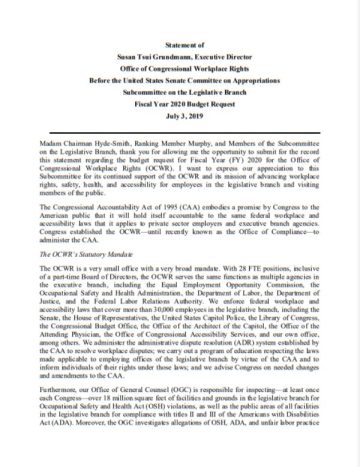Madam Chairman Hyde-Smith, Ranking Member Murphy, and Members of the Subcommittee on the Legislative Branch, thank you for allowing me the opportunity to submit for the record this statement regarding the budget request for Fiscal Year (FY) 2020 for the Office of Congressional Workplace Rights (OCWR). I want to express our appreciation to this Subcommittee for its continued support of the OCWR and its mission of advancing workplace rights, safety, health, and accessibility for employees in the legislative branch and visiting members of the public.
The Congressional Accountability Act of 1995 (CAA) embodies a promise by Congress to the American public that it will hold itself accountable to the same federal workplace and accessibility laws that it applies to private sector employers and executive branch agencies. Congress established the OCWR—until recently known as the Office of Compliance—to administer the CAA.
The OCWR’s Statutory Mandate
The OCWR is a very small office with a very broad mandate. With 28 FTE positions, inclusive of a part-time Board of Directors, the OCWR serves the same functions as multiple agencies in the executive branch, including the Equal Employment Opportunity Commission, the Occupational Safety and Health Administration, the Department of Labor, the Department of Justice, and the Federal Labor Relations Authority. We enforce federal workplace and accessibility laws that cover more than 30,000 employees in the legislative branch, including the Senate, the House of Representatives, the United States Capitol Police, the Library of Congress, the Congressional Budget Office, the Office of the Architect of the Capitol, the Office of the Attending Physician, the Office of Congressional Accessibility Services, and our own office, among others. We administer the administrative dispute resolution (ADR) system established by the CAA to resolve workplace disputes; we carry out a program of education respecting the laws made applicable to employing offices of the legislative branch by virtue of the CAA and to inform individuals of their rights under those laws; and we advise Congress on needed changes and amendments to the CAA.

